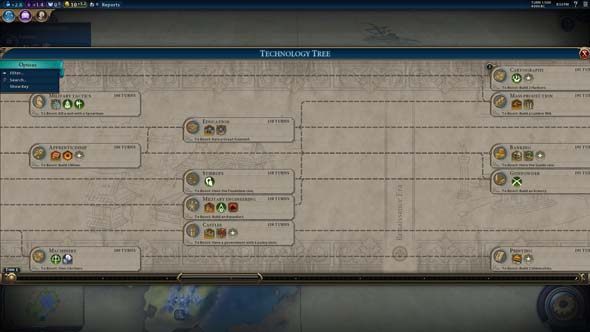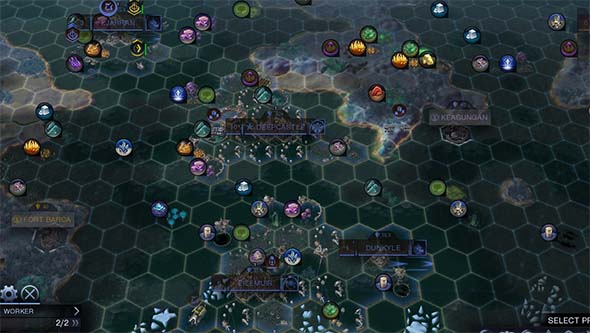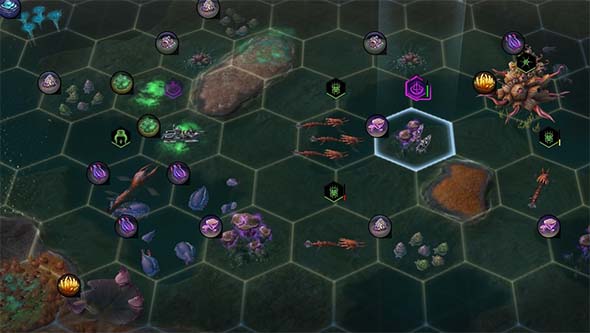
In my last post, I ranted a little bit about some of the major frustrations that I have with the way that Civilization games have historically dealt with difficulty levels. In summary, I identified three problems that I feel make it less enjoyable to play the game on higher difficulties, even if the lower difficulties still feel too easy. The three problems are:
In this post, I'd like to provide some more constructive criticism by discussing some of the thoughts and ideas that I've had for possibly resolving these three problems. These ideas include providing a wider range of options for customizing the difficulty level and game experience to suit the individual player's tastes and style, and to provide a wider (and more open-ended) set of game-long challenges.
Alternative solutions to game difficulty
So what could the developers do about these problems?
Well, the problem of game pacing could possibly be solved by inverting the handicap such that instead of speeding up the A.I.s' progress through the game, the player is slowed down. This could be accomplished by slowing down the human player's tech and civic progress, and by negatively handicapping some of the human player's yields. This would allow the A.I.s to progress at a more historically-appropriate rate, and overall game length would remain similar across all difficulties.

Padding out sparse areas of the tech and civics trees could mitigate the ability to beeline to later eras.
Rapid era progression could also be somewhat mitigated by padding out the tech and civics trees a little bit more. Beelining to the Renaissance via the "Cartography" technology is common for civs like England and Norway. There's a few ways to limit this. One simple way would be to simply make "Cartography" require either "Education" or "Military Tactics". Another way would be to have a technology between "Ship Building" and "Cartography" -- such as an "Optics" technology that unlocks an upgrade to the Scout, or a "Lateen Sail" technology that unlocks a medieval naval unit like the Cog, Hulk, Junk, or Galleass (or move the Caravel up to "Lateen Sails" but don't give it ocean-crossing abilities until "Cartography").
Customization, options, and difficulty settings
As for resolving the other issues presented by high difficulty levels, my preference would be for the developers to add more customization and tuning options for players so that we can tailor the gameplay experience and challenges more to our liking.

Civ VI has limited customization options.
Having independent sliders or settings for things like Player Handicaps, A.I. Handicaps, AI Temperament, Barbarian Spawn Rate, Barbarian Aggressiveness, Barbarian Tech Level, City State Aggressiveness, and so on would all go a long way towards allowing the player to customize the game's challenge according to their own strengths and weaknesses. Handicap settings for players and A.I. can even be further divided into different sub-categories along the lines of: Tech Handicap, Culture Handicap, Production Handicap, Gold Handicap, Growth Handicap, Happiness / Amenity Handicap, etc.. So if you find that you are consistently out-teching your A.I. opponents, but you feel you have parity with the A.I. in other areas of the game, then you could specifically buff the A.I.'s tech handicap, weaken yours, or both.
This would certainly make some of the game's code more complicated, but I don't think that it would be prohibitively difficult. The difficulty settings already make adjustments to these very same parameters, and I believe the game's own .ini files allow modders to customize many (if not all) of these attributes. I don't see any reason why such settings can't just be in the game's settings menu, and the difficulty settings (deity, emperor, king, settler, etc.) could just use some pre-configured arrangements of those values.
Other genres use similar paradigms for their difficulty settings. Sports games are a prime example... [More]
b6248b6f-1a24-40b9-86ea-99aa3b364e61|4|5.0
Tags:Sid Meier's Civilization, Civilization V, Civilization VI, Firaxis, strategy, grand strategy, difficulty, artificial intelligence, climate, politics, demographics, quest, Civilization: Beyond Earth, Madden NFL, NBA 2k16

I started writing this post months ago (back in 2015, I think) - long before I had any inkling of the impending release of Civilization VI. This post may be entirely moot now that Civ VI has been announced, and it seems unlikely to me that Beyond Earth will see further expansions. However, I still want to present these ideas, so I've re-written this post to be less speculative and more retrospective. Even if these ideas aren't fated to be implemented for Beyond Earth, it's still an opportunity to look at a way in which the game could have differentiated itself from Civ V, and they could serve as a template for future Civ titles (maybe even Beyond Earth 2) or for modders. Maybe I'll even mod it in myself if I get time and motivation.
Civilization: Beyond Earth really struggled to separate itself from Civ V. The expansion, Rising Tide takes steps to address this with some of its new gameplay mechanics and revised diplomatic engine. Sadly, these efforts don't really address one of the underlying, fundamental, disconnects that the game has with me:
"One of the things that bothered me about Beyond Earth was the way that the victory conditions create an unnecessary competition between the different civs. Aren't we all just colonists from the same earth who are supposed to be trying not to repeat the mistakes of the past? Aren't we trying to preserve the human race? Without the various civs starting the game with any sort of pre-established ideology or agendas, there's no reason for them to be competing with one another. Without a genuine shared victory, there's also no systems in place to share your colonial success with your fellow colonies. The net effect is that once you've defeated the challenge of taming the planet and [one way or another] eliminating the aliens as a threat to your expansion, then the rest of the game is a competition between civs to be the first to reach any of the [mechanically satisfying and varied, yet intellectually vapid] victory conditions."
- from my Rising Tide review

Heck, why are we competing to begin with?
Despite being mechanically different from Civ V's victory conditions, Beyond Earth still fell into the trap of being fundamentally, unnecessarily tribalistic and competitive. I don't know if this is supposed to be some kind of sad, fatalist message that Firaxis is writing into Beyond Earth: that we are doomed to repeat the mistakes of the past. This isn't Fallout. I hope that Firaxis' designers aren't that cynical, and that it was an unintentional emergent consequence of design.
This may seem like a small, trivial, superficial issue, but it's not. Regular Civilization is easy to buy into because it's based [loosely] on established history and uses real-world characters and states that most people are already familiar with. Buying into the theme of Beyond Earth is just so much harder because there's so much of the game that just doesn't make sense, or which doesn't really follow from the opening cinematic or the game's flavor text. This is why Alpha Centauri went to such great pains to personlize the leaders, and to turn them into charicatures of established real-world ideologies and standard sci-fi tropes. These are factions with established goals and agendas that we can understand, and we can buy into their conflicts. Beyond Earth doesn't have that, and so not only do its leaders fall flat as characters unto their own, but the entire basis upon which the game's core conflicts and victory conditions are based start to fall apart as well.
In any case, I think that one of the best ways that Beyond Earth could have truly separated itself from Civ V (mechanically and thematically) would have been to change the competitive nature of the victories and introduce truly cooperative victories, or maybe even a "players versus map" victory type. And I want to emphasize from the start that I haven't put nearly as much time into Beyond Earth as I have into Civ V. I'm by no means an "expert" in the game. So feel free to take the following suggestions with a grain of salt. I admit that these ideas simply might not work, but I still think that it's worthwhile to explore the possibility space that this game could have offered... [More]
41c56220-e572-46c7-b911-40df5b0b6ab2|1|5.0
Tags:Sid Meier's Civilization, Civilization: Beyond Earth, Civilization: Beyond Earth: Rising Tide, Firaxis, 2K Games, PC, Steam, strategy, grand strategy, turn-based strategy, science fiction, space, victory, cooperation, alliance, harmony, purity, supremacy, contact, first contact, domination, board game, Battlestar Galactica, Pandemic, Arkham Horror, Mansions of Madness, Descent: Journeys in the Dark

A few weeks ago, Firaxis and 2K Games ensured that fall of 2016 is going to be very busy for me. They announced Sid Meier's Civilization VI, which is due out October 21. Believe it or not, my reaction to this was actually a little bit mixed. While a new Civ game is obviously exciting, I have to fight back a feeling that it's too soon.
For one thing, I was expecting at least one more expansion for Beyond Earth, which I feel still has some annoying holes in its gameplay (most notably, its air units and generally dull orbital layer). If those holes were filled, and if the game's map could change over the course of the game, then Beyond Earth has the potential to rise out of mediocrity and stand at the same level as Civ V as a unique and engrossing sci-fi strategy game. Now, that looks very unlikely. Since the first expansion (Rising Tide) would expand the shallow naval and ocean gameplay, I had expected that a second expansion (which I had personally code-named "Falling Skies") would expand air units and orbital gameplay and maybe add flying cities.
Sean Bean introduces us to Sid Meier's Civilization VI - due October 21st.
The other reason that I felt Civ VI is too soon is because I was still hoping to get back into modding for Civ V. I still had one massive mod that I've been working on off-and-on for years that just needed some bug fixes and polish before I could release it. I had put off finishing it until after I'd completed my series of strategy guides for Civ V, and I was hoping for a few years in between games so that I could finish the mod and have time for people to play it. But now that Civ VI is announced, I feel less motivated to bother with that mod, since most players (including, most likely, me) will move onto Civ VI come October anyway. Maybe I'll work up the motivation to get that mod out anyway; we'll see. In any case, I'll hopefully get more into modding for Civ VI earlier so that I can release more content for that game, and maybe make some more ambitious projects...
The good news is that Civ VI does look to be fulfilling one of my wishes of being more focused on empire-management... [More]
a923a46b-608d-45e4-84d5-b592b2684a88|3|4.7
Tags:Sid Meier's Civilization, Civilization VI, Firaxis, civilization, 2K Games, strategy, history, hexes, city, districts, wonders, Theodore Roosevelt, Civilization: Beyond Earth, Civilization: Beyond Earth: Rising Tide, Civilization V, PC, Steam, Ed Beach, Sean Bean

I'm starting to feel like quite the prognosticator. Earlier this year, I started tossing around the idea of Nomadic civilizations for future Civ games. Around the same time, Creative Assembly announced Attila: Total War. They had apparently come up with almost the same idea independently at the same time. Well, now the teams at Firaxis have also implemented a variation of my idea for their new expansion to Beyond Earth, called Rising Tide.
This expansion seeks to remedy several of the core complaints with the Beyond Earth game. In my original review for Beyond Earth, my two biggest complaints were that the game and its leaders lacked the personality and variety of Civilization V, and that it just didn't feel futuristic enough. Both of these complaints ended up being the major focus of the first expansion, which definitely helps to make Beyond Earth stand out a little bit from its more realistic counterpart.
So we sailed up to the sun, till we found a sea of green
One of Beyond Earth's biggest failings was its lack of creativity in using its futuristic setting to innovate gameplay. The game felt very much like a reskin of Civ V rather than a new game. A big part of this was that the map posed many of the same sorts of restrictions on players that the Civ V map did: mountains, canyons, and oceans were all obstacles either impassable by units or uncolonizable by cities.

Aquatic cities and civilizations help to separate Beyond Earth's futuristic setting from Civilization's historical roots.
Well now one of those restrictions has been lifted, and civilizations can build floating cities in the oceans. Such cities can even be moved in order to claim new tiles or to act as mobile military bases. This opens up some interesting (and sometimes silly) new strategic possibilities, but the whole mechanic feels a bit contrived to me. Moveable cities is something that I think can work very well in Civilization, but I just don't feel that Firaxis gave us much reason to ever need to move cities in this game. My proposal for nomadic civilizations was two fold: such a faction could mobilize its entire civilization right up to an enemy's borders during war; and it could also move in response to changing map conditions (migrating animal resources or climate change) during peace. Beyond Earth hits that first point by turning cities into massive aircraft carriers, but there aren't any mechanics in place to make the map a factor.
Fish and other harvestable sea creatures don't migrate, and other resources don't move. So if you aren't using your aquatic cities as mobile military bases, then there's never any real need to move them. And if you're not playing as the North Sea Alliance faction, then the cost to move a city can feel prohibitively expensive. The people at Firaxis seemed to have recognized this, and so they made it so that aquatic cities don't grow their borders based on culture. Instead, you must either buy new tiles or move the city itself in order to acquire adjacent tiles. But since moving takes valuable production time away from the city, I rarely find myself moving a city, and instead I just buy any tiles that I want.
Aquatic cities can be moved, and can act as mobile military platforms and aircraft carriers.
There are other pros and cons to aquatic cities, such as health benefits, faster virtue acquisition, and more profitable trade routes. You can also move the cities around to temporarily acquire resources that allow you to build specific resource buildings, but at the cost of possibly temporarily hurting your city's growth or production (and maybe even starving the city if you move away from food-generating tiles). So there's a lot to think about when build an aquatic or nomadic civilization, but it all feels kind of like ad hoc mechanics in order to make the mechanic seem more meaningful than it actually is. That isn't to say that mobile cities is a bad feature in Beyond Earth. It's perfectly functional, and can be fun to play around with. It just feels a little gimmicky.
Just look at the world around you, right here on the ocean floor
It certainly helps that the oceans themselves are a much bigger part of the game. The ocean isn't just divided into coastal tiles and empty ocean anymore. There's a whole host of new aquatic resources, and even the sea floor itself has different features. This definitely provides some incentive and reward to building floating cities, since the ocean can be a rich source of resources. The ocean tiles themselves can even be improved with a variety of new improvements (including basic farms and mines).

The oceans are alive with life and resources, giving reason to found aquatic cities.
Aliens are also active in the oceans. Sea creatures will build nests (just like their land counterparts), and there's a new alien creature called Hydrocoral that is stationary but which spreads across the ocean surface if left unchecked. Resource pods, artifacts, and quest triggers can all also be found in the ocean. So there's plenty to do in the water now, oceans feel more like a genuine part of the map rather than just dead space between continents, and the variety of features and resources in the ocean helps to make the world look more alien.
... [More]
da86c697-6def-4ade-b575-051869e1f38d|2|5.0
Tags:Sid Meier's Civilization, Civilization: Beyond Earth, Civilization: Beyond Earth: Rising Tide, Rising Tide, Firaxis, 2K Games, PC, Steam, strategy, grand strategy, turn-based strategy, science fiction, space, water, aquatic city, nomad, ocean, trench, submarine, diplomacy, affinity, alien, Civilization: Beyond Earth

Over the weekend of March 7, I was once again invited to participate in the Civilization podcast "PolyCast". It's always enjoyable to participate in this show. DanQ and the others always do an excellent job (even though Dan wasn't in this episode).
I particularly enjoyed this one because I felt that I had more to contribute than on some of the other episodes that I've been invited to. Part of that was because I actually reviewed the topics in advance and prepared for the episode. But it was also advantageous that one of the topics discussed was my own blog post about Civ VI ability ideas. I don't think that discussion made it into the edited episode, but it will perhaps make it into a clip show later in the year. Even so, I felt like I had valuable commentary on the other topics, and there were some good discussions.
The episode can be streamed in its entirety at thePolyCast.net.
The first and most significant topic of conversation was about a video posted by Errant Signal that takes a critical look at the meta-themes of Civilization and what they say about our perception of what it is to be "civilized".
His primary criticism is that the game unnecessarily puts civilizations in competition with one another, rather than fostering a spirit of cooperation; and that the various victory conditions in the game are very "American", "Western-centric" ideals. So our PolyCast panel discussed these criticisms and different game mechanics that contribute to them, as well as ideas for ways to alleviate them (particularly on the topic of victory conditions).
Another significant topic of conversation was whether or not we really want the different civilizations to have unique units and powers in the game. The question was posed on the Civfanatics forums by user Naokaukodem, who seems to be arguing in favor of removing the unique units and making them accessible to any civilization that techs to them. I think it is safe to say that the panelists on PolyCast were not in favor of such a change, and some good arguments (both mechanically and thematically) are made in favor of keeping the uniques as they are.
There were also some other discussions of various Beyond Earth topics and some other discussion. I'm not sure if all of it made it into the final edited episode, as we went well over the allotted time. So some of the discussion might have to be rolled into one of PolyCast's future clip shows. After listening to the full episode, all the topics discussed in the live podcast did make it into the edited version available on the site.
Thanks, as always, to the PolyCast hosts for the invitation. I hope to participate again soon! [More]
d761ab9a-2bc4-4601-9cc8-c61634f57c2a|1|5.0
Tags:Civilization, Sid Meier's Civilization, Civilization V, Civilization V: Gods & Kings, Civilization V: Brave New World, Civilization: Beyond Earth, Errant Signal, Civfanatics, PolyCast, Firaxis, podcast, DanQ, Makahlua, TheMeInTeam, Talcove, SemperFi2382, Civilization III, Civilization IV, Civilization V, Civilization: Beyond Earth
|

| 12 | | | | | | | 60 | | 11 | | | | | | | 55 | | 10 | | | | | | | 50 | | 09 | | | | | | | 45 | | 08 | | | | | | | 40 | | 07 | | | | | | | 35 | | 06 | | | | | | | 30 | | 05 | | | | | | | 25 | | 04 | | | | | | | 20 | | 03 | | | | | | | 15 | | 02 | | | | | | | 10 | | 01 | | | | | | | 05 |
|